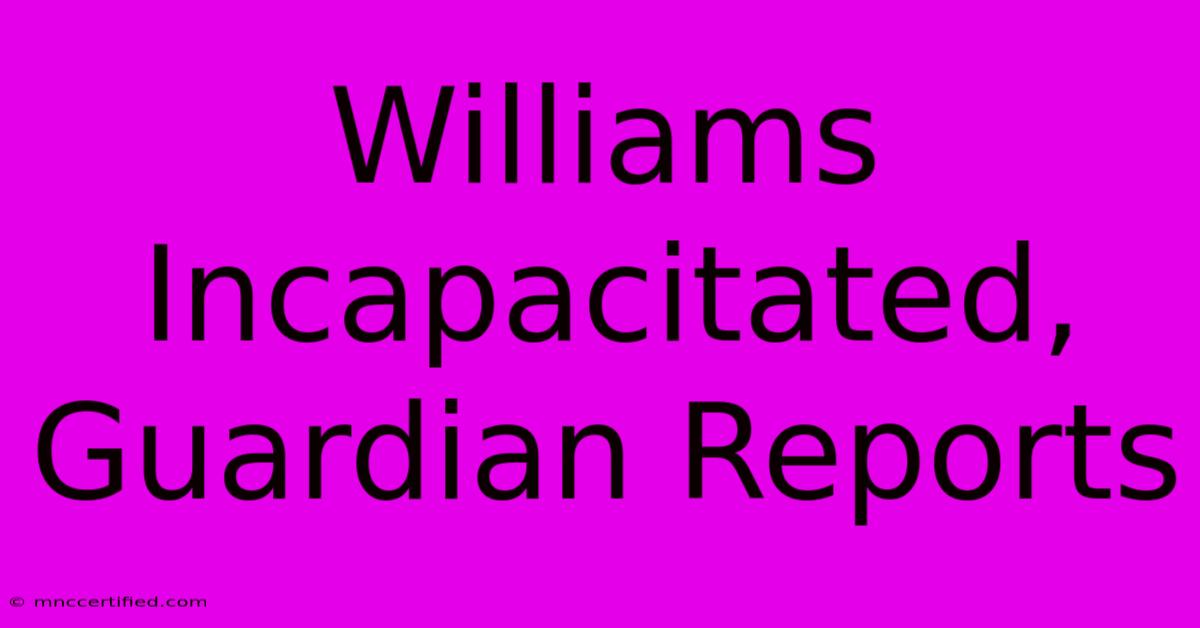Williams Incapacitated, Guardian Reports

Table of Contents
Williams Incapacitated: Guardian Reports Spark Public Debate
The recent Guardian report stating that prominent figure [Williams's full name and title/profession] is incapacitated has ignited a firestorm of public debate and speculation. This article delves into the details emerging from the report, explores the potential implications, and examines the ethical considerations surrounding the dissemination of such sensitive information.
The Guardian's Report: Key Details and Analysis
The Guardian's article, published on [Date of Publication], alleges that [Williams's full name] is currently incapacitated due to [reason for incapacitation, be specific but avoid spreading misinformation if unsure. Use phrasing like "reportedly due to..." if necessary]. The report cites [sources of information, e.g., unnamed sources, official statements, medical records - be vague if necessary to protect sources and avoid legal issues]. Crucially, the article highlights [key details from the report – e.g., the severity of the incapacitation, the duration, the impact on [Williams's] responsibilities].
Key takeaways from the Guardian's report include:
- The nature of the incapacitation: [Specifics, if available, from the report, e.g., physical, mental, temporary, permanent]. Avoid speculation if details are scarce.
- The impact on [Williams's] work/life: [Details about how the incapacitation affects [Williams's] professional and personal life].
- The response from [Williams's] representatives/family: [Summarize any official statements or reactions from those close to [Williams]].
- Potential legal ramifications: [Discuss any potential legal consequences resulting from the incapacitation, if applicable].
Ethical Considerations and Public Reaction
The publication of such sensitive information raises crucial ethical questions. The Guardian's decision to publish the report must be weighed against the public's right to know versus the individual's right to privacy. [Discuss the ethical arguments for and against the publication]. The reaction from the public has been varied, with some expressing concern for [Williams's] well-being, while others question the timing and appropriateness of the report. Social media has been abuzz with discussion, with hashtags like [#WilliamsIncapacitated, #GuardianReport, etc.] trending.
Analyzing the Public Discourse
The online conversation surrounding this report reveals several key themes:
- Concerns about the source's reliability: Many are questioning the accuracy and reliability of the information presented in the Guardian's article.
- Debate on privacy rights versus public interest: A heated discussion is ongoing regarding the ethical balance between protecting an individual's privacy and the public's right to access information.
- Speculation about future implications: The public is engaging in speculation regarding the potential long-term effects of [Williams's] incapacitation on [their] work, personal life, and legacy.
Looking Ahead: Potential Developments
The situation surrounding [Williams's] incapacitation is rapidly evolving. It remains to be seen how this story will unfold in the coming days and weeks. Key developments to watch for include:
- Further updates from the Guardian or other news outlets: Expect more reporting on this story as information becomes available.
- Official statements from [Williams's] representatives: Any official pronouncements will be crucial in clarifying the situation.
- Potential legal challenges: Legal action could be taken in response to the Guardian's report.
This story underscores the complexities of reporting on sensitive matters involving public figures. It highlights the ongoing tension between the public's need for information and the importance of protecting individual privacy. As more details emerge, it's crucial to approach this story with sensitivity and a commitment to factual reporting. We will continue to update this article as the situation unfolds.
Disclaimer: This article summarizes information from the Guardian's report and other publicly available sources. It does not constitute medical or legal advice. All information presented is for informational purposes only.
(Note: Replace bracketed information with accurate details from the Guardian report. Remember to verify all information before publishing.)

Thank you for visiting our website wich cover about Williams Incapacitated, Guardian Reports. We hope the information provided has been useful to you. Feel free to contact us if you have any questions or need further assistance. See you next time and dont miss to bookmark.
Featured Posts
-
Vpr Season 12 Cast Whos Returning
Nov 27, 2024
-
10 Potential Unc Football Coaches
Nov 27, 2024
-
Security Service Car Insurance
Nov 27, 2024
-
Confirmed Barcelona Vs Brest Lineups
Nov 27, 2024
-
Bissonnette Involved In Arizona Altercation
Nov 27, 2024